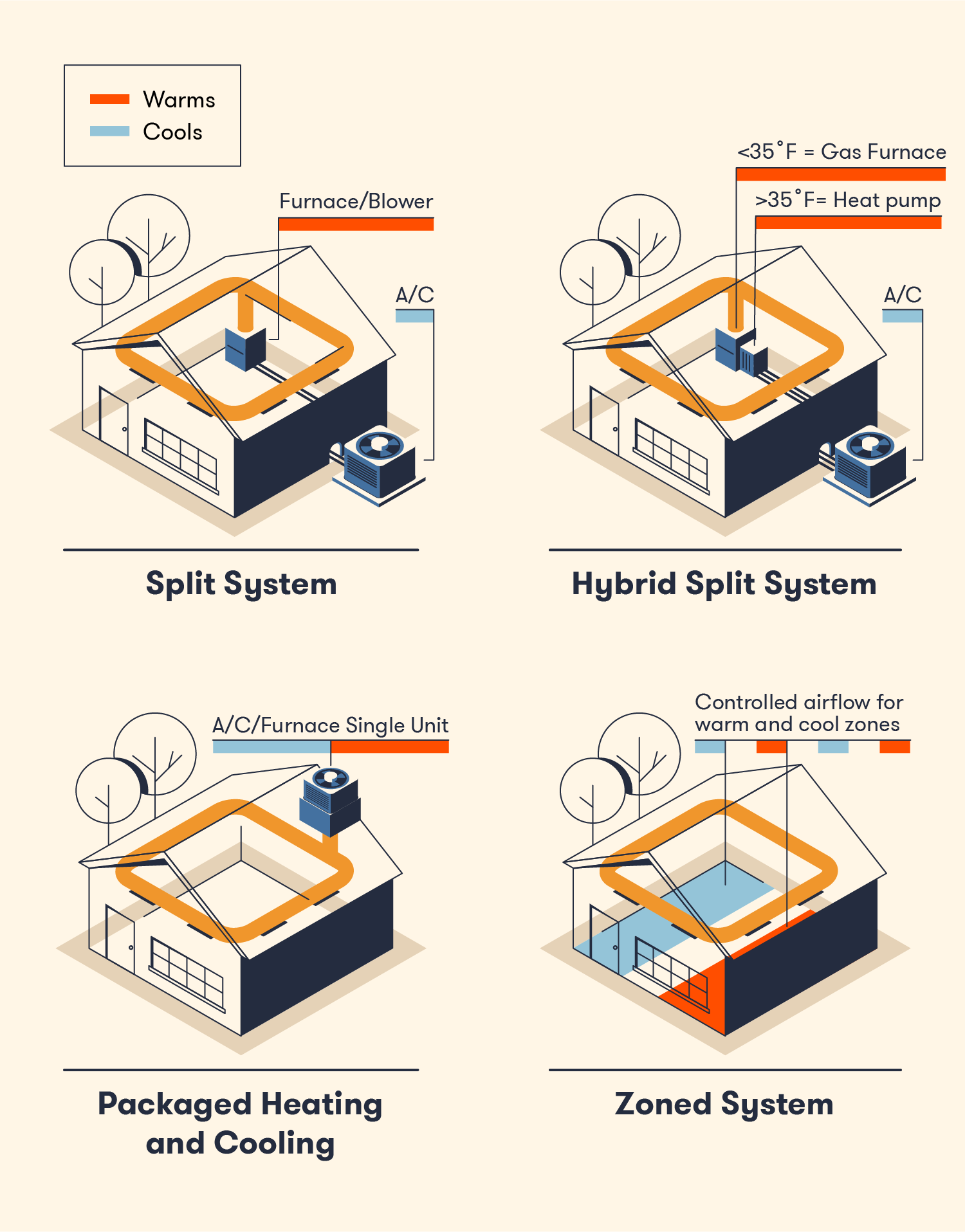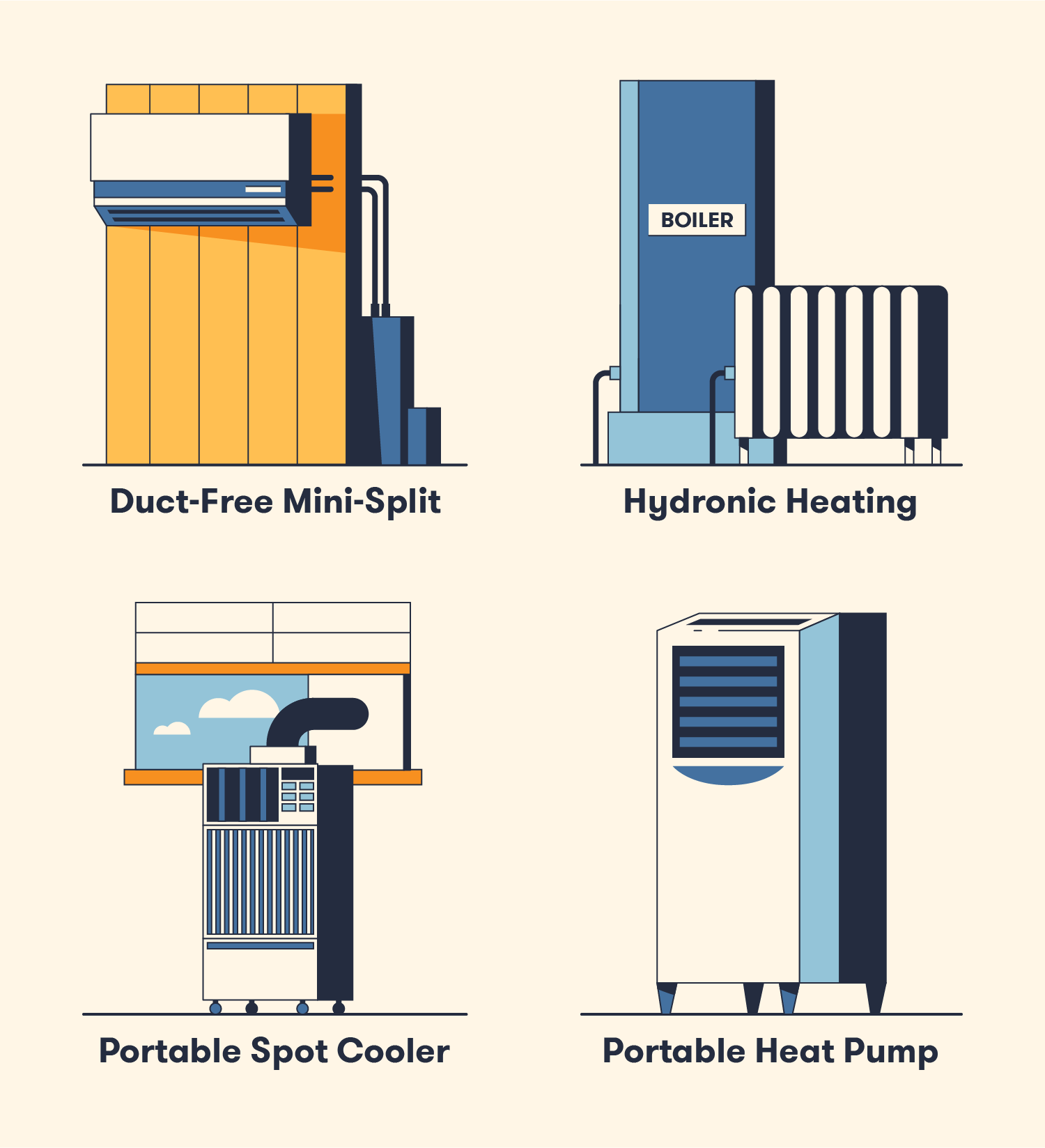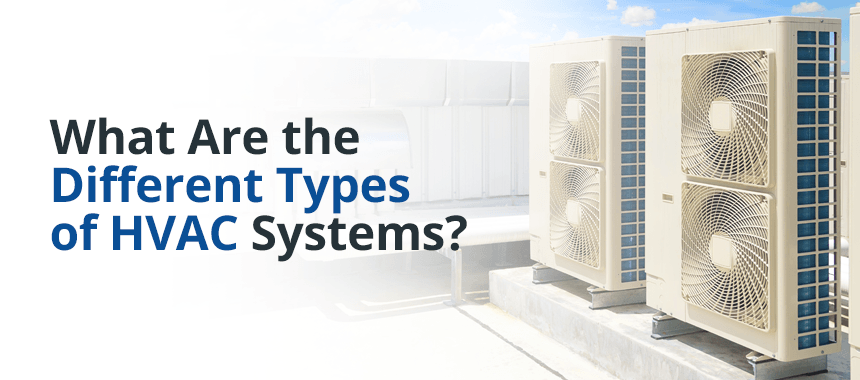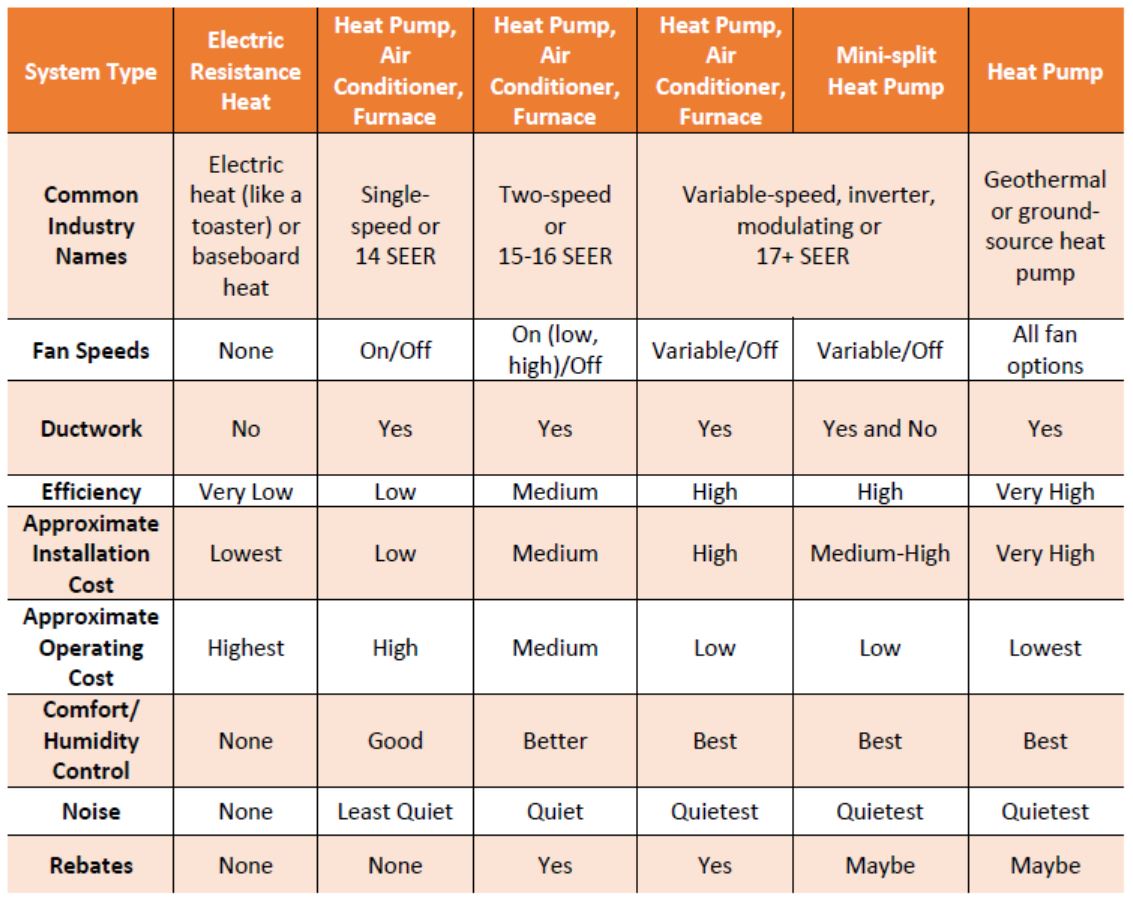Send us an email
Please enter your name and contact info.
Please enter your name and contact info.
Call Us Today! (850) 748-1066

Serving Families Throughout Pensacola
In this article, you will explore the fascinating world of HVAC systems. We will take a closer look at the various types of HVAC systems available, allowing you to understand the differences between them and choose the one that best suits your needs. Whether you are looking for a system for your residential or commercial space, this article will provide you with valuable insights and guidance. Get ready to discover the world of HVAC systems and make an informed decision for your heating and cooling needs.
Split systems are the most common type of central air conditioning system found in homes. As the name suggests, these systems consist of two main components: an indoor unit and an outdoor unit. The indoor unit contains the evaporator coil and the blower, while the outdoor unit houses the compressor and condenser coil.
The split system works by pulling warm air from inside your home through the return ducts and passing it over the evaporator coil. The evaporator coil cools the air and removes moisture, before the cooled air is distributed throughout your home via the supply ducts. Meanwhile, the outdoor unit releases the heat extracted from the indoor air into the outside environment.
Split systems offer a cost-effective solution for cooling your home, as they are more energy-efficient compared to other types of air conditioning systems. They also allow for more precise temperature control, offering the ability to set different temperatures for each room or zone.
Packaged systems, also known as rooftop units, are another type of central air conditioning system. Unlike split systems that have separate indoor and outdoor units, packaged systems have all the components integrated into a single cabinet that is typically installed on the rooftop or on an exterior wall of the building.
These systems are often preferred for commercial buildings or homes with limited indoor space, as they do not require an indoor unit. The main advantage of packaged systems is their ease of installation, as the entire system is pre-built and just needs to be connected to the ductwork.
Packaged systems come in different varieties, including air-cooled and water-cooled units. Air-cooled packaged systems use the outdoor air to dissipate heat, while water-cooled units rely on water to remove heat from the system.
Ductless systems, also known as mini-split systems, provide a flexible cooling solution for homes without ductwork or for specific areas that require independent temperature control. These systems consist of an outdoor unit connected to one or more indoor units through refrigerant lines.
Each indoor unit can be independently controlled, allowing you to set different temperatures for each room or zone. This makes ductless systems ideal for homes with varying cooling needs or for creating customized comfort zones within a larger living space.
Ductless systems can be installed in various configurations, such as wall-mounted, ceiling recessed, or floor-mounted units. They are energy-efficient and easy to install since no ductwork is required. Ductless systems are also a popular choice for additions, renovations, or spaces that require separate cooling, such as garages, workshops, or sunrooms.
Air source heat pumps are a type of HVAC system that provides both heating and cooling capabilities. These systems work by extracting heat from the outdoor air during the winter and transferring it indoors to warm your home. In the summer, the process is reversed, and heat is absorbed from the indoor air and released outside to cool your home.
Air source heat pumps are efficient and environmentally friendly, as they do not burn fossil fuels to generate heat. They can significantly reduce energy consumption and lower utility bills compared to traditional heating and cooling systems.
Ground source heat pumps, also known as geothermal heat pumps, utilize the constant temperature of the ground to provide heating and cooling. These systems use underground pipes or loops filled with a water-based solution to exchange heat with the ground.
During the winter, the ground source heat pump extracts heat from the ground and transfers it indoors to warm your home. In the summer, the process is reversed, and heat is extracted from your home and released into the cooler ground.
Ground source heat pumps are highly efficient and can provide substantial energy savings. They are also more durable and require less maintenance compared to other types of heat pumps. However, the installation cost of ground source heat pumps is usually higher due to the complexity of the underground loop system.
Water source heat pumps are similar to air source heat pumps, but instead of extracting heat from the outdoor air, they utilize a water source such as a pond, lake, or well. These systems circulate water through an underground or underwater piping system, exchanging heat with the water source.
Water source heat pumps can provide efficient heating and cooling throughout the year, as the temperature of the water source remains relatively constant. They are particularly suitable for areas with a readily available water source and can offer significant energy savings.

This image is property of acropolis-wp-content-uploads.s3.us-west-1.amazonaws.com.
Natural gas furnaces are one of the most common heating systems found in homes. These furnaces burn natural gas to generate heat, which is then distributed throughout the house via ductwork and registers. Natural gas furnaces are known for their reliability, efficiency, and cost-effectiveness.
If you have access to natural gas in your area, a natural gas furnace can provide consistent and comfortable heating during the colder months. These furnaces are also compatible with central air conditioning systems, allowing you to have a combined heating and cooling solution.
Propane furnaces are an alternative to natural gas furnaces for homes that do not have access to a natural gas supply. Propane, also known as liquefied petroleum gas (LPG), is stored in a tank and delivered to the furnace for combustion.
Propane furnaces operate similarly to natural gas furnaces, producing heat that is distributed through ductwork to warm your home. They are a reliable and efficient option for heating, especially in areas where natural gas is not available.
Electric furnaces rely entirely on electrical energy to generate heat. These systems use electric resistance elements, such as heating coils, to convert electrical energy into heat. The heated air is then distributed throughout your home through the ductwork.
Electric furnaces can be a practical choice for areas where electricity is a more affordable and readily available energy source compared to natural gas or propane. They are generally easy to install and require minimal maintenance.
Electric furnaces are also popular for their safety features, as they do not involve combustion and do not produce harmful emissions. However, they may have higher operating costs compared to gas or propane furnaces, depending on the price of electricity in your area.
Steam boilers are a type of heating system that utilizes water to generate steam for heating purposes. These systems work by heating water in a boiler until it becomes steam, which is then circulated through pipes to radiators or baseboard heaters in your home.
The steam released by the boiler transfers heat to the surroundings, providing efficient and consistent heating. Steam boilers are known for their reliability and ability to produce high BTU (British Thermal Unit) outputs, making them suitable for larger homes or commercial buildings.
Steam boilers require regular maintenance, including water level monitoring and the removal of sediment or mineral deposits. They can also be noisy due to the release of steam and may have higher installation costs compared to other heating systems.
Hot water boilers, also known as hydronic boilers, use water to distribute heat throughout your home. These boilers operate by heating water in a closed system and then circulating it through pipes to radiators, baseboard heaters, or radiant floor systems.
Hot water boilers offer precise temperature control and can provide comfortable heating throughout your home. They are typically more energy-efficient compared to steam boilers, as they do not experience heat losses due to steam condensation.

This image is property of www.ocplumber.com.
Single-zone ductless mini-split systems are designed to cool or heat a single room or area. These systems consist of one outdoor unit connected to one indoor unit. They offer independent temperature control for the specific area they serve, allowing you to maximize comfort and energy efficiency.
Single-zone systems are easy to install since they do not require ductwork. They are a great solution for rooms that lack ventilation or have specific cooling or heating needs, such as additions, guest rooms, or home offices. With a single-zone ductless mini-split system, you can create a personalized and comfortable environment for any individual space in your home.
Multi-zone ductless mini-split systems are designed to cool or heat multiple rooms or zones within your home. These systems consist of one outdoor unit connected to multiple indoor units, each serving a specific area or room.
With a multi-zone system, you have the flexibility to set different temperatures for each zone, allowing for personalized comfort throughout your home. This is particularly advantageous if you have varying cooling or heating needs in different areas of your house.
Multi-zone ductless mini-split systems offer energy-efficient operation, as you can cool or heat only the areas that require it. They are relatively quiet and provide seamless temperature control for enhanced comfort and convenience.
Through-the-wall units, also known as packaged terminal air conditioners (PTACs), are self-contained cooling and heating units installed through an exterior wall. These units are commonly used in hotels, motels, apartments, or individual rooms where individual temperature control is desired.
Through-the-wall units are compact, efficient, and easy to install. They feature an all-in-one design, with the evaporator, condenser, and compressor all housed within a single unit. The units can be controlled individually, allowing occupants to set their desired temperature and fan speed.
Through-the-wall units are a cost-effective option for cooling and heating small spaces, providing convenient temperature control and comfort.
Heat pump PTACs are a variation of through-the-wall units that provide both cooling and heating using heat pump technology. These units offer efficient and versatile operation, as they can extract heat from the outdoor air during winter and provide cooling in the summer.
Heat pump PTACs are energy-efficient alternatives to traditional resistance heating units, as they can deliver heating at a fraction of the energy consumption. They are often used in hotels, motels, or other applications where individual temperature control is required.

This image is property of acropolis-wp-content-uploads.s3.us-west-1.amazonaws.com.
Window air conditioners are self-contained units designed to fit into a window or a specially designed opening in a wall. These units are commonly used to cool individual rooms or smaller living spaces.
Window air conditioners include a refrigeration cycle that cools the air and removes moisture. They are typically installed by placing the unit in a window opening and securing it in place. The cooled air is then directed into the room, while warm air and condensation are released to the outside environment.
Window air conditioners are a cost-effective cooling option for smaller spaces, as they require less upfront investment and installation compared to central air conditioning systems. However, they may offer less efficient cooling and limited temperature control compared to other types of systems.
Geothermal heating and cooling systems, also known as ground source heat pumps, utilize the constant temperature of the ground to provide both heating and cooling for your home. These systems work by circulating a water-based solution through underground pipes or loops to exchange heat with the ground.
During the winter, the geothermal system absorbs heat from the ground and transfers it indoors to warm your home. In the summer, the process is reversed, and heat is extracted from your home and released into the cooler ground.
Geothermal systems are highly efficient and can provide substantial energy savings compared to traditional heating and cooling systems. They are environmentally friendly, as they utilize renewable energy from the ground.
However, the installation cost of geothermal systems is generally higher due to the complexity of the underground loop system. However, the long-term cost savings can outweigh the initial investment, making geothermal an attractive option for homeowners looking for sustainable heating and cooling solutions.

This image is property of leggettinc.com.
Radiant floor heating is a heating system that works by installing heating elements, such as hot water tubes or electric cables, beneath the floor surface. These systems distribute heat evenly across the floor, radiating warmth upward to provide comfortable heating for the entire room.
Radiant floor heating can be installed in various types of flooring, including tile, stone, wood, or even concrete. It offers a cozy and uniform heat, eliminating cold spots and drafts commonly associated with traditional forced-air systems.
Radiant floor heating is energy-efficient, as it operates at lower temperatures compared to forced-air systems. It can also provide better indoor air quality by minimizing the circulation of dust and allergens.
Radiant panel heating is similar to radiant floor heating but utilizes heating panels installed on walls or ceilings instead of the floor. These panels radiate heat directly into the room, providing gentle and consistent warmth.
Radiant panel heating is versatile and can be used in various applications, such as residential homes, offices, or commercial buildings. The panels can be designed to blend seamlessly with the surrounding decor, offering both heating functionality and aesthetic appeal.
Radiant panel heating is an energy-efficient heating solution, as it minimizes heat loss compared to traditional forced-air systems. It also allows for better control over individual comfort preferences, as each panel can be independently controlled.
Hybrid HVAC systems combine multiple heating and cooling technologies to provide optimal comfort and energy efficiency. These systems typically consist of a heat pump and a furnace, and they intelligently select the most efficient method of heating or cooling based on the outdoor conditions and indoor demand.
During moderate temperatures, the hybrid system utilizes the heat pump for efficient heating or cooling. When extreme temperatures occur, the furnace takes over to provide the necessary heating capacity. The system automatically switches between the two modes, maximizing comfort and minimizing energy consumption.
Hybrid HVAC systems offer the advantages of both heat pumps and furnaces, providing energy-efficient operation and flexibility in various weather conditions. They are an excellent choice for homeowners looking for a versatile and cost-effective solution for year-round comfort.
In conclusion, HVAC systems come in various types, each offering unique benefits for heating and cooling your home. From central air conditioning systems like split systems, packaged systems, and ductless systems, to heat pump systems like air source heat pumps, ground source heat pumps, and water source heat pumps, to furnace systems such as natural gas furnaces, propane furnaces, and electric furnaces, and to boiler systems like steam boilers and hot water boilers – there are options available to suit different needs and preferences. Additionally, ductless mini-split systems, packaged terminal air conditioners, window air conditioners, geothermal heating and cooling systems, radiant heating systems, and hybrid HVAC systems provide further choices for optimal comfort and energy efficiency. Consider consulting with a professional HVAC provider like Diamond Air Design in Pensacola, FL, to determine the best HVAC system for your home and ensure reliable and efficient heating and cooling year-round.

This image is property of www.advancedenergy.org.